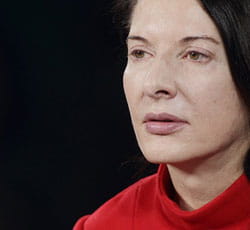By Jessica Bratt
 Staring at people and crying are two things New Yorkers typically avoid doing in public. But this spring, all were welcome to engage in either or both within the walls of the Museum of Modern Art. Marina Abramovic, a Yugoslav-born performance artist, invited passersby to become participants during her latest exhibit, "The Artist is Present." The ingredients? Marina, silent, seated on a chair in a bare room. An empty chair facing her, on which anyone could take a turn, and on which the sitter could sit for as long as he or she wanted. For two and a half months, during every hour the MoMA's doors were open, Marina was there, sitting.
Staring at people and crying are two things New Yorkers typically avoid doing in public. But this spring, all were welcome to engage in either or both within the walls of the Museum of Modern Art. Marina Abramovic, a Yugoslav-born performance artist, invited passersby to become participants during her latest exhibit, "The Artist is Present." The ingredients? Marina, silent, seated on a chair in a bare room. An empty chair facing her, on which anyone could take a turn, and on which the sitter could sit for as long as he or she wanted. For two and a half months, during every hour the MoMA's doors were open, Marina was there, sitting.
I first learned of Marina's seated marathon from Arthur Danto's New York Times piece, "Sitting with Marina," in which he summarizes contemporary performance art theory and recounts his own experience of sitting with Marina. I am no performance art connoisseur, but what drew me in, and has yet to let me go, was the set of portraits by photographer Marco Anelli, who captured an image of every person who sat with Marina. Each portrait's caption indicates how long the person sat with Marina. Go to the MoMa's Flickr images and look at even just a few of the more than 1500 portraits. No, really, go and look. These are not typical portraits.
It doesn't take a large sample size to get the point: something powerful happened when people sat in that chair. It looks like they've never seen anything quite like what they're seeing. I have observed people rapt with attention in front of a painting or sculpture in a museum, but not like this. Not radiant with emotion. Not fixated. Not crying.
What was it about sitting across from a complete stranger for a few minutes that could evoke tears?
What I see in those faces, those faces that embody the diverse palette of demographics in an incredibly busy, crowded, fast-paced city like New York, is the deep and universal hunger for authentic human connection. The tears, I suspect, are a sort of catharsis. People were moved because Marina offered them the rare gift of being fully present with them. The interaction was truly immediate -- not mediated by any sort of technology, not defined by an agenda, not propped up with any of the background noise that pervades urban life, not confined by a time limit. Nothing stood between Marina and her guests; even the table that had been placed between the chairs at the beginning of the exhibit was removed. There was no language barrier, no need to translate or explain anything. What each person received was pure encounter.
Marina seems to have mastered the "non-anxious presence" that so many clergy, chaplains, counselors, and others aspire to develop, over against the human instincts to fill silence with noise, to always have a schedule and a plan, to hurry along and keep busy, to have a goal and desired outcome, to evaluate and judge.
Such a gift of presence reminds me of the incarnation: God communicated to people through creation, through word, and through prophets, but ultimately God put flesh on the word and came to sit with us as one of us. God chose to be present, not mediated by storm or flood or stone tablets, but right here in the fragile flesh. And it's that kind of presence which, when we risk to engage in it, helps us to see the image of God in one another, to see, as Hopkins put it, the way that "Christ plays in ten thousand places, Lovely in limbs, and lovely in eyes not his."
Ever-evolving technologies seek to convince us that we can stay more connected than ever, no matter how mobile or global our lives become. But Marina's work is a reminder that there is no substitute for full, real presence, and that other forms of staying connected, although not illusory, are nonetheless merely approximations of what we really crave. We undermine our own and others' longings for connection when we settle for giving and receiving attention that is divided too many ways, spread too thin, or kept too far removed. There is something holy about extending and receiving the invitation to be fully present.
This article was first published in Faith & Leadership and is reprinted with permission.
Jessica Bratt is ordained in the Reformed Church in America and currently serves on denominational staff as Executive Coordinator in the Office of the General Secretary.
7/13/2010 4:00:00 AM




